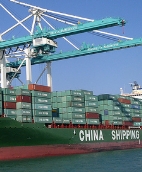Li Xiaolin is the CEO of China Power International Development Limited and a councillor for the Copenhagen Climate Council. chinadialogue editor Isabel Hilton caught up with her at the World Business Summit on Climate Change in Copenhagen.
Isabel Hilton (IH): What is the use of the World Business Summit, from a Chinese point-of-view?
Li Xiaolin (LX): I am a councillor for the Copenhagen Climate Council, a group that will convene at the climate-change talks in Copenhagen [in December], at which people from all over the world who are passionate about peace will deliver a proposal. I think that because the world belongs to everyone – if I can carry out some specific actions related to environmental protection, I will be very happy.
At this global business leaders’ meeting, everyone will have the opportunity to see Al Gore, the former US vice-president, and the United Nations secretary-general Ban Ki-moon – who have both come as speakers to this meeting. Today is the last day, and the prime minister of Denmark and I were on a panel together. Entrepreneurs and the leaders of countries from all over the world place a lot of importance on this. I also attended a roundtable meeting with the Danish prime minister, at which there were representatives from the United States, the United Kingdom, Germany, Denmark and, of course, China. Everybody sat down together and had the chance to discuss global issues, to create common actions for common goals – and to do things to protect our planet. I think this event was influential in a good and meaningful way.
IH: What were the results of the discussion?
LX: The result was a plan to promote a concerted action for the whole world – but how this plan will be implemented depends on the final proposal that comes from the UN climate talks. By means of appeals and suggestions, we are setting a standard to which every nation must adhere.
IH: China’s economy is very important, but we only see a few Chinese representatives at this meeting. Do you think people in China have a good understanding of the dangers of climate change? Are they aware of this problem? If so, why aren’t they here?
LX: China has changed a lot in these past years. We have seen changes to the economy, and along with economic growth, people’s awareness of environmental protection has started to change, too. You can see that the Chinese government is not only developing the economy, but is also committed to environmental protection. We are promoting the “scientific concept of development”.
As the economy has developed, the Chinese government has placed a lot of importance on protecting the environment. For a number of years, we have formulated many policies and strategies, including a white paper that was an announcement to the whole world that we are not only developing the economy, but also putting practical importance on protecting our shared planet. For example, from 1990 to 2007, our policies toward enterprises meant the reduction of the equivalent of 210 million tonnes of carbon dioxide – a huge figure.
As a businesswoman attending the conference, I bumped into many old friends: some from the government, such as Xie Zhenhua, vice-minister at the National Development and Reform Commission – an expert in this field, some from the China National Offshore Oil Corporation (CNOOC) and some private entrepreneurs, such as Shi Zhengrong [of Suntech Power Holdings].
I think that Chinese businesspeople will slowly discover these kinds of international meetings, and they will gradually start to attend them. You have a few of us here as representatives already. I want to reiterate that I am devoted to the development of renewable energy. In our office, we have our own business culture, which I refer to with the idiom “still waters run deep”: our generation does not only want to bring light and motivation to the world, but also we want to leave clear water and blue skies for future generations. Because of this, we are implementing clean energy.
IH: Do you think China’s successes will inhibit the work of addressing climate-change?
LX: I don’t think this work can be the effort of any one person or one country, because this planet belongs to everyone, and it needs everybody’s contribution. So, today we have started the tasks that we must undertake with diligence. I hope that every person and every country will work hard together and make our planet even more beautiful.
Li Xiaolin is the CEO of China Power International Development Limited
Isabel Hilton is editor of chinadialogue
Homepage photo by Yibinxueyuan




